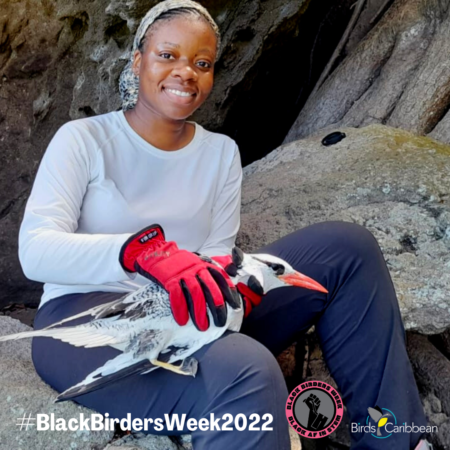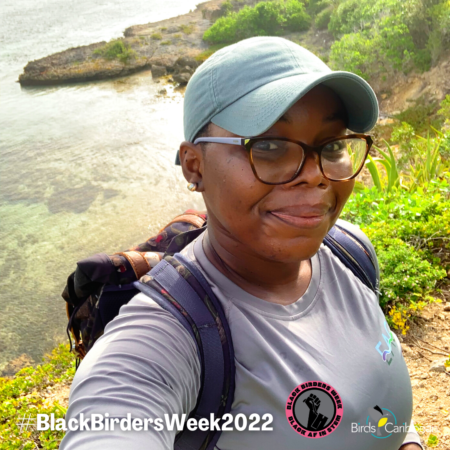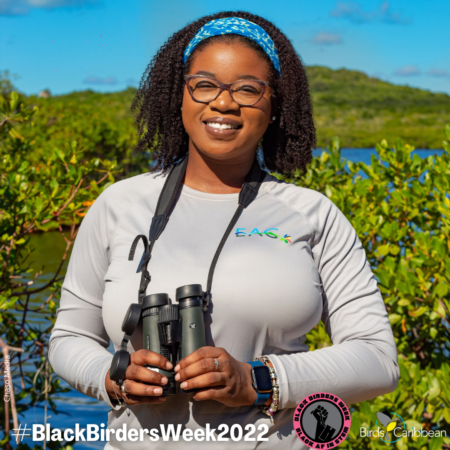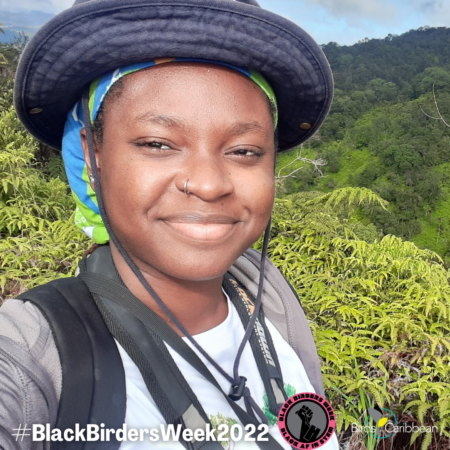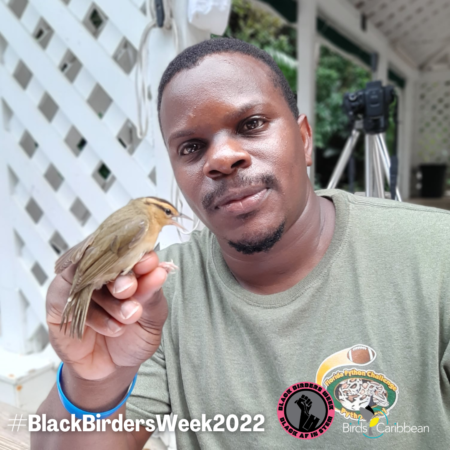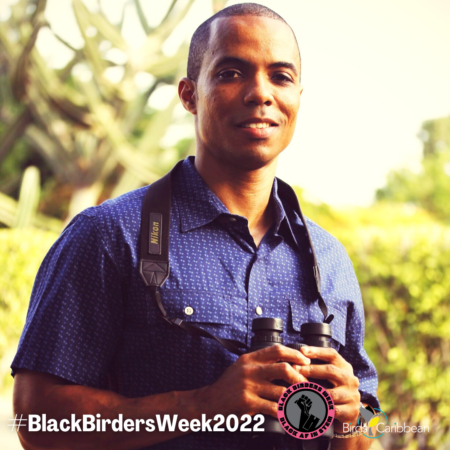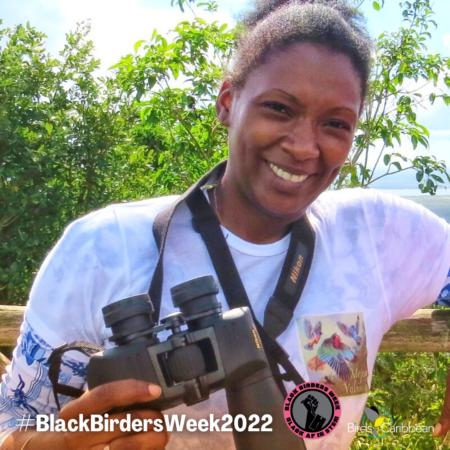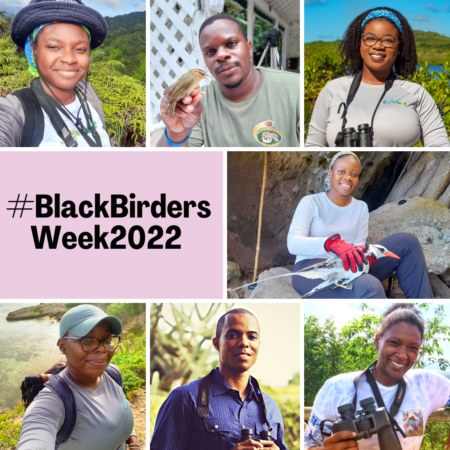 Black Birders Week is a social media campaign which seeks to highlight the important presence of people of color in the birding and conservation communities. It is a week-long celebration, organized by the Black AF in STEM Collective, of Black outdoor enthusiasts, naturalists, and conservationists, focusing on their cultural perspectives of the world in which we live. This year’s theme, “Soaring to Greater Heights”, emphasizes birding as a lifelong learning journey that is enjoyed by Black cultures across the diaspora.
Black Birders Week is a social media campaign which seeks to highlight the important presence of people of color in the birding and conservation communities. It is a week-long celebration, organized by the Black AF in STEM Collective, of Black outdoor enthusiasts, naturalists, and conservationists, focusing on their cultural perspectives of the world in which we live. This year’s theme, “Soaring to Greater Heights”, emphasizes birding as a lifelong learning journey that is enjoyed by Black cultures across the diaspora.
We are extremely grateful to be working in the Caribbean where any person, regardless of race, can enjoy birds and nature. At BirdsCaribbean we truly believe that nature is for everyone and are continuously working to create opportunities for Caribbean nationals to advance their conservation and leadership skills through workshops, mentorship programs and by providing funding for critical research.
However, we know that, beyond the region, Black people are still underrepresented in the natural sciences and academia. Therefore for Black Birders Week 2022, we are shining the spotlight on the following Caribbean leaders:
Ajhermae White- #InTheNest
Environment Officer
Department of Environment
Montserrat
Instagram: @sajhkp
How did you first get interested in birds?
The Conserving Caribbean Shorebirds and Their Habitats International Training Workshop in 2019, hosted by BirdsCaribbean in Puerto Rico, was my first in-depth introduction to birds. Upon returning home, from the workshop, a male Lesser Antillean Bullfinch was nesting at my house, which further ignited my interest in birds. I remember using a field guide I received from BirdsCaribbean to identify it. I was so happy that I found its name. After that, my knowledge of birds skyrocketed. Now in 2022, I can identify just about all resident birds and their calls on Montserrat and many migrants and vagrants. Working in the Department of Environment in Montserrat gives me the opportunity to learn about birds and work with them.
Did you have anyone take you under their wing?
James ‘Scriber’ Daley took me under his wing at the start of my birding journey. He is the best on the island and his knowledge of birds is exceptional. I am grateful that I have been able to learn so much from him.
If you’ve been at it for a while, have you become a mentor to someone else?
Now that I have become so passionate about birds I have gained the courage to go on public platforms to share my knowledge with the community. With the help of BirdsCaribbean and Environment of the Americas, I have been able to organize many educational events on resident and migratory birds. I’m so happy that I have been able to share my knowledge with children and adults on Montserrat.
Johnella Bradshaw- #LearningToTakeFlight
Redonda Ecosystem Reserve Coordinator
Environmental Awareness Group (EAG)
Antigua and Barbuda
Instagram: @jcstarss
What were your first steps into birding on your own?
My introduction into birding began roughly one year ago, when I started working at the EAG. I remember receiving my “Birding Bubble Bundle” that the group had curated, to celebrate the annual Caribbean Endemic Bird Festival in collaboration with BirdsCaribbean. Little did I know, I was about to embark on a journey, as I would be #LearningToTakeFlight in the vast world of birding.
Immediately after skimming through the contents of my bundle I began birding in my backyard. I recorded 4 species and counted 10 birds around my home. I was beyond excited to see my backyard “magically” turn into an ecological haven before my eyes. After identifying birds such as the Antillean Crested Hummingbird, adorned with its vibrant hues of greens and blues and its distinctive mohawk crest, I found a deeper appreciation for the environment around me, and I knew I wanted to learn more.
I wanted to learn more about the different birds in my country and there was no better opportunity than during the EAG’s Bird and Lizard Surveys on our offshore islands. I quickly had to learn about land birds, seabirds, and shorebirds. Who would have thought that there are so many different types of birds? NOT ME!
I love that birding is an activity for any and everyone!
When did you feel comfortable enough to call yourself a birder?
Birding not only connects people to nature but it also connects people to people. Although I consider myself to be a “baby birder,” I am happy to be learning from the birding enthusiasts, and experts in the field that I work with on a daily basis. I have been exposed to so many new opportunities and skills, ranging from bird photography to bird banding, that this journey has, so far, been nothing short of amazing.
So, what are you waiting on? It is time to take flight!
Shanna Challenger- #LearningToTakeFlight
Offshore Islands Conservation Programme Coordinator
Environmental Awareness Group (EAG)
Antigua and Barbuda
Instagram: @specieswithshanna
What were your first steps into birding on your own?
My very first step of course was obtaining a pair of binoculars – you got to be able to see the birds! Second was strengthening my ID skills – I found as many bird ID guides and resources as possible and focused on the unique identifiers of a few familiar birds. I would use these “core birds” as my measuring stick for how others differed from them e.g. is it larger than a bullfinch but smaller than a grackle?
Lastly was getting out there and going birding – starting off in my backyard, around my workplace, and then expanding to birding hotspots across the island. As a scientist, data collection is crucial and once confident in my species IDs, I used eBird to record my sightings.
When did you feel comfortable enough calling yourself a birder?
“One does not simply choose to become a birder, the birding life chooses you.” I would say I finally became comfortable when I slowly realized birding had become second nature to me. Everywhere I went and encountered a bird, the species name and behavior would automatically pop into my head. And of course, the true confirmation of birder status came with the fact that I started to convert all my friends, coworkers and family members into birders too, one step at a time.
Zoya Buckmire- #DayOfRoost
Graduate Student
University of Manitoba
Canada
Why is it important for us to know when to ‘roost’?
Mankind has long gleaned lessons from our avian neighbors, from the mechanics of flight to indications of habitat quality. But what about more subtle lessons, like when and where to roost? Choosing a conducive environment (a safe sheltered tree or your happy place), settling in on the evenings after a long day of foraging (or completing projects), and surrounding yourself with birds of a feather (pun intended) are all important for ensuring you get the best roost (and rest!) possible. Birds also take extra time to recharge and fuel up before strenuous activities like migration, and so should we before embarking on new projects in order to protect our mental health. This is especially important for those of us at the intersection of several minorities as we face up against imposter syndrome, oppressive systems, and our own goals and limitations. Taking time off is the best way to avoid burnout and provide balance in our increasingly hectic lives. Only with proper rest and recovery can we then soar to greater heights.
Scott Johnson- #FlyingTheCoop
Environmental Officer
BRON Ltd.
The Bahamas
Facebook: Scott Johnson (The Bahamian Naturalist)
What motivated you to take the leap to go after your passion?
When I was a child, I got a hold of a dinosaur book called “Dinosaurs” by the National Geographic Society and was fascinated by them. This later became a childhood obsession and my interest in dinosaurs evolved into an interest in birds and other animals. I continued to geek out on animals and wanted to become a biologist. However, upon going to the then College of The Bahamas at the time, it seemed as though there was no place in The Bahamas where I could become a field biologist. I did not want to become a vet or a medical doctor, but it looked as if those avenues were the only options for me. So, for a few years I was trying to convince myself to pursue one of those disciplines. Eventually, I became frustrated and turned to GOD and basically said to Him that I do not know how I was going to become a biologist or where I was going to work, but I am going to pursue this field no matter what. Soon after, one of my schoolmates told me about the Kirtland’s Research and Training Project that trains Bahamians in field biology and helps conservationists to learn more about the (then endangered) Kirtland’s Warbler. I applied and was accepted, and the rest in history.
What’s something you’ve always wanted to try or challenge yourself with?
As I continue to teach Bahamians, I realize that there are major gaps in Bahamian terrestrial research, and a lack of young people desiring to become terrestrial field scientists—like myself. As environmental work continues to grow in my country, the need for skilled field biologists is a necessity. I hope I can be one of those persons (wildlife trainers) who will lead this charge in a bigger capacity. So going for a Ph. D is in my future.
When is it time to pivot and “Fly The Coop”?
During certain times of the year, something inside birds triggers them to prepare for migration and reproduction. This trigger is not properly understood but we scientists know that it happens. When the season is right, I believe that that trigger will be squeezed. Until then, I am still training and gaining skills.
#AsTheCrowFlies- Leo Douglas
Past President of BirdsCaribbean
Assistant Clinical Professor
NYU, Liberal Studies
Twitter: @leo_r_douglas
What is birding like in Jamaica?
Birding in Jamaica is a particular privilege; the island is home to many island and regional Caribbean endemic species. It is also a key stopover site for many Neotropical migrants. Additionally, there are multiple ecological biomes from dry forest to cloud forest. Thus, the birding is always rich, varied, and geographically accessible.
Reflect on where you have gone birding and how it’s helped you pave relationships with people of different cultures.
I started birding in high school through a youth program organized by college-aged youth. Thus, from the get-go my journey with birds was inspired by youth and my passion has always been to work with youth in the outdoors, exploring the natural world.
How has your own culture shaped your relationship with birds and your birding journey?
Being from a small island has always given me a sense of the urgency around valuing and protecting birds and forests. Jamaican forest and species are highly restricted in range and our cultural associations with them are similarly unique and threatened. I came to the understanding, very early on, that bird and nature conservation on my island was ultimately up to Jamaicans. Culture and identity has ultimately driven the ways I see and value birds.
#LifelongJourney- Inés Lourdes Fernández
Wildlife Specialist
Empresa Flora y Fauna Santiago de Cuba
Cuba
Instagram: @lu861211
Comencé a dar mis primeros pasos en el fascinante mundo de las aves, hace unos años ya durante mi etapa universitaria con el grupo de ornitología del Centro Oriental de Ecosistema y Biodiversidad, (BIOECO) en Santiago de Cuba. Ahí supe que las aves iban a ser mi boleto de ida para conocer los secretos de la naturaleza y adentrarme más en la observación de ellas. Mis primeras aves observadas y estudiadas en esta etapa, fueron las rapaces migratorias, Águila pescadora, Halcón peregrino, así conocí de todo el proceso de migración.
Mi primer binocular lo obtuve gracias a Optics for the Tropics, durante el Festival de Aves Endémicas del Caribe en el 2018 y de inmediato agarré mi guía y me dirigí al área protegida más cercana a observar aves en compañía de mis colegas de trabajo. Al principio éramos dos y poco a poco hemos sumados más interesados. Hoy, no solo realizamos observaciones de aves sino también enseñamos a las comunidades, mediante la Educación Ambiental y la vinculación a actividades de investigación, el maravilloso mundo de las aves, así ayudan a su protección.
Hoy me considero una amante de las aves. Observarlas me ha permitido relacionarme y conectarme con otras personas que comparten esta pasión, intercambiar datos y opiniones, desarrollar habilidades y acceder a nuevas oportunidades como la fotografía.
Todavía me falta un mundo por aprender, pero poco a poco voy conociendo y sumando más amigos y colegas a la observación.
English translation
I took my first steps into the fascinating world of birds a few years ago, while at university with the ornithology group of El Centro Oriental de Ecosistemas y Biodiversidad (BIOECO) in Santiago de Cuba. From that point, I knew that birds were going to be my one-way ticket to learning the secrets of nature and diving deeper into observing them. The first birds I observed were migratory raptors: Osprey and Peregrine Falcon, and this is how I learned about the whole migration process.
My first binoculars were sponsored by Optics for the Tropics, during the Caribbean Endemic Bird Festival in 2018. I immediately grabbed my guide and went to the nearest Protected Area to observe birds in the company of my colleagues. At first there were two of us and little by little, more people interested in learning about birds and nature joined us. Today we not only make bird observations but also teach communities, through Environmental Education and linking to research activities, the wonderful world of birds, thus helping their protection.
I consider myself a lover of birds. Observing them has allowed me to relate and connect with other people who share this passion, exchange data and opinions, develop skills, and access new opportunities, such as photography.
I still have a world to learn, but little by little I am getting to know more about birds and adding more friends and colleagues to my community.
It is our hope that by recognizing Black Birders Week we increase the visibility of Black Caribbean birders and naturalists and their contributions to conservation. We also hope that this will encourage other agencies and institutions to support their employees and members who are Black and to actively seek ways to make the workplace and outdoors more inclusive and welcoming.
To learn more about Black Birders Week and how you can join the celebration please visit: https://www.blackafinstem.com/bbw2022schedule

